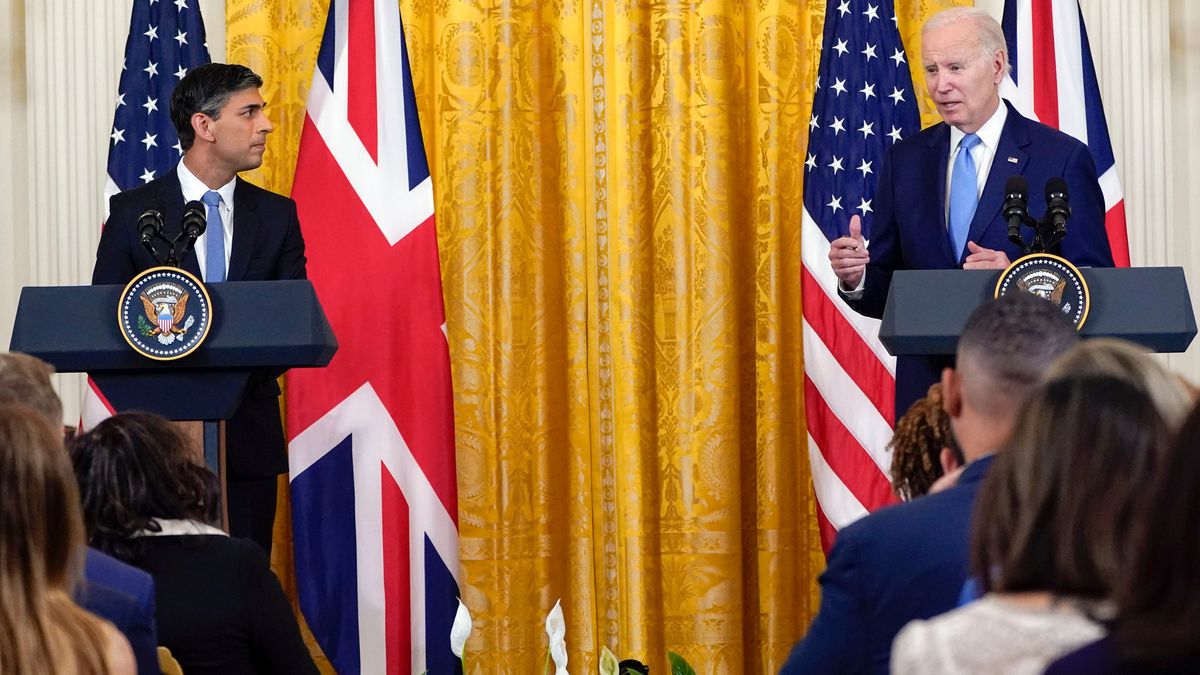 US President Joe Biden and British Prime Minister Rishi Sunak at a White House press conference Manuel Balce Ceneta (AP)
US President Joe Biden and British Prime Minister Rishi Sunak at a White House press conference Manuel Balce Ceneta (AP)
US President Joe Biden and British Prime Minister Rishi Sunak announced on Thursday an intensification of economic relations between their countries. It is a consolation prize for Britons and their quest for a free trade deal, and seals the restoration of traditional bilateral friendship after a few years of alienation from the Donald Trump era. “We can absolutely trust each other,” said the British Prime Minister at a joint press conference after the two met in the Oval Office.
The so-called “Atlantic Declaration” signed by the two heads of state and government provides for an intensification of bilateral cooperation in areas ranging from the energy transition to the defense industry, including the development of hypersonic missiles. It also envisages both countries negotiating a trade deal on critical minerals vital to the energy transition towards cleaner sources: they are needed, among other things, to make solar panels and batteries for electric vehicles. Currently, its extraction and processing are almost entirely controlled by China.
The two countries also pledge to increase cooperation in the development of artificial intelligence, semiconductors and quantum technology and other high-tech sectors. They also want to strengthen the reliability of the supply chains.
The agreement was drafted with the idea of confronting China and Russia, the two countries that have formed a quasi-non-military alliance, and aims to strengthen their nations’ economic security, an increasingly priority objective of Washington’s foreign policy. and other western allies. This doctrine, which has gained further traction after the war in Ukraine and what the US perceives as a threat of “economic coercion” from Beijing, subordinates trade and industrial policies to national security considerations rather than the principles of free trade.
“China and Russia are willing to manipulate, exploit or steal our intellectual property, use technology for authoritarian purposes and deprive us of critical resources such as energy. “You won’t get it,” Sunak said.
The message to be conveyed by Sunak’s visit was that after a number of years in which the mandates of Donald Trump on one side of the Atlantic and Boris Johnson and Liz Truss on the other led to a certain distance between bilateral relations, both governments are returning to a narrow path.
Join EL PAÍS to follow all the news and read without restrictions.
subscribe to
This Thursday’s meeting is the fourth that Biden and the British Prime Minister have held in less than a year. The first took place during the G20 summit in Bali last November. Meetings followed in California to announce a nuclear submarine deal for Australia as part of the Aukus Alliance in March, and in Belfast in April to mark the 25-year Good Friday Peace Agreement for Northern Ireland.
They have demonstrated harmony on every occasion, whether in their outspoken support for Kiev after Russia’s invasion of Ukraine fifteen months ago or their firm stance on China, which is now reflected in the Aukus Accords.
Both leaders planned to raise issues such as the war in Ukraine or economic security in their bilateral affairs, in areas such as protecting supply chains or protecting economies from coercive measures by other countries. According to the British Embassy in Washington, the British leader wanted to express London’s willingness to “priority to economic security similar to how we have prioritized security, defense and intelligence-sharing in the past”.
Sunak also wanted to address the UK’s aspirations in artificial intelligence, one of his top priorities. The Prime Minister has convened the first global summit on AI for this autumn in London. According to British media, he is also aiming for a future global regulator based in this capital.
“The United States is our closest ally. You and we are the respective partner to whom we turn first when it comes to keeping our citizens safe or growing our economies. That’s why it’s so important for a British Prime Minister to develop a close and open relationship with the President Washington took up.
Follow all international information on Facebook and Twitteror in our weekly newsletter.

